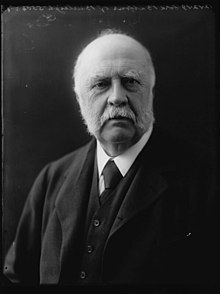Committee on Commercial and Industrial Policy
[1] The Prime Minister, H. H. Asquith, appointed the Committee in July 1916 in order to implement the Paris Resolutions.
A. Pease (Liberal), George Wardle (Labour), Sir Henry Birchenough and Richard Hazleton (Irish Nationalist).
[1][2] The experience of the war had challenged laissez-faire economic beliefs: at its first meeting (on 25 July 1916) Balfour instructed its members to "cast aside any abstract fiscal dogmas".
[5] The committee's final report dealt with the future of British industry both in commercial competitiveness and capacity for war: It is in our opinion a matter of vital importance that, alike in the old-established industries and in the new branches of manufacture which have arisen during the war, both employer and employed should make every effort to attain the largest possible volume of production, by the increased efficiency of industrial organisation and processes, by more intensive working, and by the adoption of the best and most economical methods of distribution.
[And] it is only by the attainment of this maximum production and efficiency that we can hope to secure a speedy recovery of the industrial and financial position of the United Kingdom and assure its economic stability and progress.
